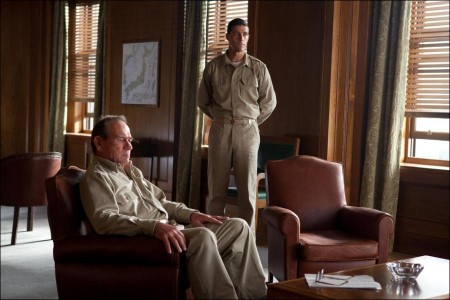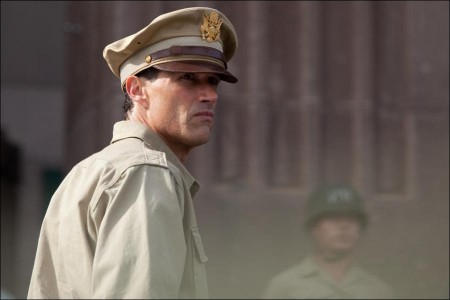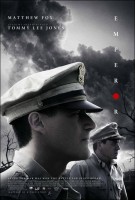Emperor is an American-Japanese post-World War II film directed by Peter Webber, marking his first film in five years. Tommy Lee Jones and Matthew Fox star in lead roles as General Douglas MacArthur and Brigadier General Bonner Fellers respectively. It is a joint American and Japanese production.
The drama of war has long been prime cinematic territory — but it is often the hidden aftermath of war that raises the most provocative and intriguing human questions. In the shadowy gap between when battle has ended but before peace has broken out, emotions are raw, nerves and hearts are on edge and clashing agendas play out, as enemies vie to cross the vast distance between the instinct for vengeance and the dream of reconciliation.
EMPEROR, the first contemporary Hollywood film set during the U.S.-led occupation of Japan at the close of World War II, unfolds a story of both secret love and international intrigue in a post-war world where trust is in short supply and the stakes for the future could not be higher.
The story is based on the events of 1945, following the dropping of the atomic bombs on Hiroshima and Nagasaki, when Japan’s sacred leader, Emperor Hirohito, unconditionally surrendered. Faced with leading the Allied Powers’ occupation of the ravaged country, President Harry S. Truman tasked the American hero General Douglas MacArthur with the epic, make-or-break job of restoring order and preparing the way for democratic elections.
Yet even before he arrived in a firebombed Tokyo reduced to rubble on August 30th, MacArthur knew he faced an extraordinary dilemma: what to do about the Emperor? Should the man revered by many as a god and the living embodiment of the Japanese spirit stand trial and likely be hanged to pay for the war’s brutal crimes — or could there be any other way of moving forward while the whole world was watching?
Behind the scenes, one man was given just a few days to investigate if the Emperor’s prosecution should proceed: Bonner Fellers, an American with a deep love of Japanese culture, who would ultimately help MacArthur choose a bold course. Fellers’ story had been largely lost in the vast annals of World War II, known only to hardcore history buffs, until he became the hero of a riveting screenplay by David Klass and Vera Blasi.
Diving deep into the historical records, Klass and Blasi also opened their story up into imagined territory — as Fellers finds himself swept up not only into a dangerous political game, but into a driven search for the Japanese woman who introduced him to the soulful beauty of Japan and has haunted his heart ever since.
The Perilous Journey to Peace (2013)
The journey of EMPEROR began with producer Yoko Narahashi (THE LAST SAMURAI) who has long been interested in the fertile territory where East and West. As a child, Narahashi had been riveted by stories from her grandfather, Teizaburo Sekiya, who served in the high palace as a key member of Emperor Hirohito’s Ministry of the Interior — and played a role in bringing MacArthur and the Emperor together for the meeting that would change their fates.
Decades later, the war-scarred Japan that Narahashi’s grandfather described seemed almost unimaginable — and she became fascinated by just how it was that the most dire of enemies had been transformed with blinding speed into the closest of allies as Japan rebuilt from the ashes.
Narahashi knew there were many personal stories about how the occupation integrated the past into a new future for both Japan and the U.S., but one in particular caught her eye. This was the story of Bonner Fellers, who from the outside might seem to be a minor figure among General MacArthur’s newly arrived team in 1945 — but turned out to have made himself into a history-changing human bridge between two ways of life in those days of peril and mistrust.
“I was very intrigued by what I saw as a truly international story, a story about both Japan and the West,” says Narahashi. “I’m always fascinated by unsung heroes and when I learned about Bonner Fellers, I realized that here was someone who no one really knows yet, but he had a great deal to do with the changing of history. That was a very compelling start.”
As Narahashi began to research Fellers and to read some of his writings from the war, she found that he sometimes wrote about visiting an unnamed “friend” in Japan and she wondered if perhaps there was a love story lurking within. There could be no proof, but Narahashi saw an opportunity for a writer’s imagination to take the next step. Thus was born the seed of the fictional character of Aya, the alluring schoolteacher who reveals to Fellers a side of Japan that will forever change his mind about the country — even as the pair is star-crossed by war.
Narahashi’s instincts were affirmed when she told her 101 year-old uncle, Teizaburo Sekiya’s son, about the movie. She recalls: “He gave his blessing to us and when I asked him if he had a message to give us, he said, ‘Make it a burning love story.'”
Narahashi brought the idea of a burning, cross-cultural love story in occupied Japan to the novelist and screenwriter David Klass, known for such thrillers as KISS THE GIRLS and DESPERATE MEASURES, but who also had worked as a schoolteacher in Japan himself. Klass drafted the first screenplay.
In the meantime, a stellar production team came into place including Gary Foster and Russ Krasnoff of Krasnoff/Foster Entertainment, known for a wide range of high-profile films spanning from SLEEPLESS IN SEATTLE and THE SOLOIST to GHOST RIDER and DAREDEVIL and actor / film producer, Eugene Nomura. Each was drawn by the potential for blending history, intrigue and romance — and by a truth-based tale that has never before been told on the screen.
“I’ve always wanted to do a movie about this period,” says Foster, “and I found the story of how MacArthur and Fellers had to make this profound decision about the Emperor in such a short period of time, under the most extreme pressures, very dramatic. Then, I fell head over heels for the script’s love story.”
Foster was especially captivated by the idea of bringing to light a part of World War II that has so far largely escaped cinematic exploration. “People have seen a lot about life during the war, but the story that hasn’t been told is how after the war ended, the peace was negotiated,” he notes. “This story is something fresh that illuminates a period many people thought they knew in a different way — and I find that very intriguing.”
Producer Eugene Nomura saw the story not only as historical — but also as compellingly relevant to our own times of international conflicts, global uncertainty as well as unprecedented natural disaster in Japan. “This is a story about how Japan was rebuilt after the war, and Japan after the tsunami of 2011 in some ways looks similar to Japan in 1945,” he observes. “So I think it means a lot to tell this story right now about the country trying to rebuild and make it work for the right reasons.”
To further hone the script, Foster brought in screenwriter Vera Blasi, known for her passionate love of history and finesse with psychologically rich characters. Right away, she found the heart of the story. “To me it’s about how justice and truth are juxtaposed with political expedience and what will be the greater good for the world,” she explains. “I just find that fascinating and it continues to be very important in our world.”
Blasi saw the love story between Fellers and Aya as the perfect vehicle to tell the story of two seemingly disparate cultures who must find common ground to co-exist. “The political story and the love story bring in two different views of the world in 1945,” she comments.
Indeed, in the final script, the depth of Bonner Fellers’ yearning to find Aya is both the source of his respect for Japanese culture and his inspiration for trying to uncover if the Emperor might have tried to halt the terrible consequences of the war. Aya’s spirit haunts Fellers’ every move, even if he does not yet know her fate.
“A love story is always universal,” sums up Narahashi, “but the beauty of the love story in EMPEROR is that it leads an American man to make a momentous decision for Japan.”
Emperor (2013)
Directed by: Peter Webber
Starring: Matthew Fox, Tommy Lee Jones, Eriko Hatsune, Kaori Momoi, Toshiyuki Nishida
Screenplay by: Vera Blasi, David Klass
Production Design by: Grant Major
Cinematography by: Stuart Dryburgh
Film Editing by: Chris Plummer
Costume Design byB Ngila Dickson
Set Decoration by: Daniel Birt
Art Direction by: Jill Cormack
Music by: Alex Heffes
MPAA Rating: PG-13 for violent content, brief strong language and smoking (historical).
STudio: Lionsgate Films, Roadside Attractions
Release Date: March 8, 2013
Visits: 41





